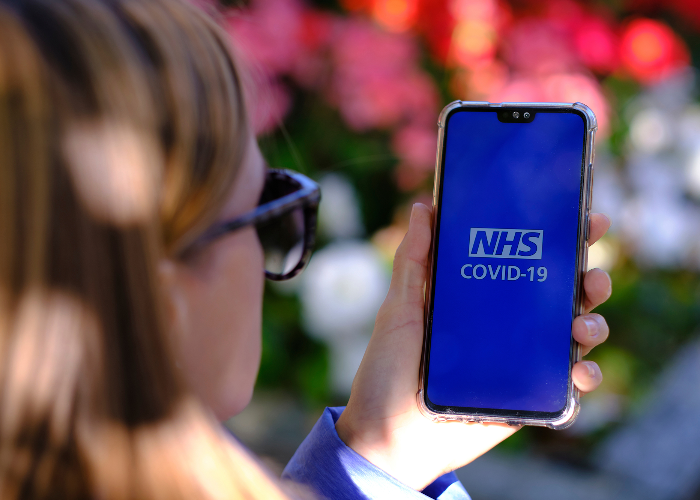NHS Test and Trace scam: warning over fake self-isolation texts, emails, calls and home visits

Scammers are sending out fake self-isolation messages and even knocking on doors pretending to work for NHS Test and Trace in a bid to steal your personal information.
Scammers are imitating NHS Test and Trace in order to trick people into handing over personal details or even dishing out fake self-isolation fines.
With many thousands of Brits getting text alerts to self-isolate and NHS Test and Trace staff knocking on doors unannounced, fraudsters have spotted an opportunity to con people.
This will either be in the form of fake text and email alerts, a phone call, or someone actually visiting your house,
In all instances, the crooks will either try and get you to share personal information or payout for a 'fine'.
It's understandable why someone will be wary of ignoring anyone claiming to work for Test and Trace. After all, it’s a legal requirement to self-isolate if you test positive or are identified as a contact and told to self-isolate by Test and Trace – if you don’t, you could be fined at least £1,000.
To help you identify fake NHS Test and Trace self-isolation alerts, phone calls or home visits, we’ll run through what you can expect if you are genuinely contacted by Test and Trace – and the telltale signs you're dealing with a scammer.
COVID-19 testing costs: how much you'll pay if you want to visit a green, amber or red country
How to tell an NHS Test & Trace visit is genuine
If you get a knock on the door from someone claiming to work for NHS Test and Trace, take note of their clothing: they should be wearing a branded uniform and identify themselves and present identification, including their name, role and employer.
The UK Government has hired a private contractor to do quarantine checks, so they should have identification and a Home Office letter of authority.
They’ll state your name and ask you to confirm it, as well as request identification such as a driving licence or passport for confirmation.
You’ll then be asked a few questions to ensure you’re self-isolating and you may be offered extra information or guidance if necessary.
NHS Test and Trace staff will follow social distancing guidelines if it’s possible and may do follow-up visits within the 10-day quarantine period.
If they believe you’re not following quarantine rules, they may refer your case to the police, who may issue you with a fine of at least £1,000 – if they have ‘reasonable grounds’ to believe you committed a criminal offence. Fines can be hiked for repeat offences.
Private COVID-19 tests: where you can get one, costs & how they work

How to spot a fake NHS Test and Trace visit
There are many tell-tale signs that someone does not legitimately work for NHS Test and Trace and are trying to defraud you.
For example, legitimate NHS Test and Trace staff will confirm your name – they will never ask you to provide this or ask to enter your property.
Any questions that are asked will be related to quarantining and staff won’t give you notice prior to any visits.
NHS Test and Trace staff will never:
- Ask for your National Insurance number, phone number or other identifying information (other than passport or driving licence);
- Ask for financial details such as bank or credit card information;
- Issue a fine or ask for money – only the police can issue fines for breaching quarantine rules.
If you believe someone is pretending to work for NHS Test and Trace, it’s recommended that you dial 999 and notify the police immediately.
Received a visit from the genuine NHS Test and Test that you weren’t expecting as you don’t need to quarantine? Contact NHS Test and Trace or call 119 to confirm you shouldn’t be self-isolating.
New COVID scam: watch out for fake digital passports
Fake NHS Test and Trace phone calls
NHS Test and Trace may well ring you if you're required to self-isolate, so you can't immediately dismiss any call you receive as fake.
How can you tell if you're dealing with a scammer? Take note of the phone number: it should read 0300 013 5000.
Of course, it's possible for scammers to mimic, or spoof, a number so this isn't a guarantee the call is genuine, but it will help you immediately identify scammers calling from a different number.
Next, anyone asking for any of the information listed in the previous section is another giveaway you're dealing with a crook.
If you really aren't sure, or uncomfortable on the call, Full Facts recommends that you ask for an email or text that will invite you to use Test and Trace online instead.
We'll cover how to ensure you land on the correct site in the next section.
Fake Test and Trace text and email alerts
Test and Trace might also contact you by text or email about self-isolating, so again, you can't just dismiss such alerts as fake.
The NHS has provided a photo of what a genuine Test and Trace alert looks like here.
The message should state:
“You need to self-isolate immediately. You have been in close contact with someone who has coronavirus (COVID-19). Tap here for more details.”
As for emails, they should come from NHS Test and Trace COVID-19 App and contain the subject line:
‘Public Health Message: NHS COVID-19 App’
In terms of where you're directed for more information, it should be: https://contact-tracing.phe.gov.uk/
No genuine message will ask you to call a premium rate number, provide bank details, make a payment or share any personal information. If you have already done so, it's important you notify your bank as soon as possible.
You can find more information on spotting a fake Test and Trace email or text on this NHS page.
Comments
Be the first to comment
Do you want to comment on this article? You need to be signed in for this feature